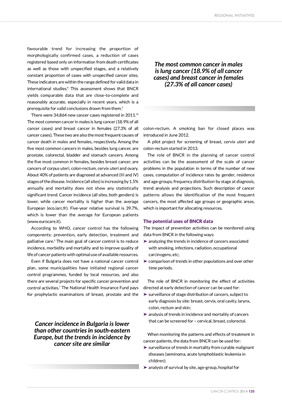
treatment and period of diagnosis;
‰ studying the proportion of patients who received
different treatments, according to the guidelines for
standard care;
‰ analysis of the time to initiation of treatment, which can
be used in estimating the need for additional facilities (for
radiotherapy, systemic treatment) in certain regions in
order to ensure equal access to treatment.
The information provided by BNCR about patients
diagnosed in advanced stages, can be useful in planning
resources for palliative care. Through links with other data
sources (hospital information systems, etc.) patients with
progressions of the disease (metastases) can be identified in
order to accurately assess the needs of palliative care.
Although BNCR has sufficient data to participate in each
stage of cancer control, the use of such data by responsible
state institutions and policy-makers is incidental and is well
below the potential opportunities the data provides. At the
same time, some changes that have taken place in recent
years in the organization of health care in Bulgaria may affect
data collection as regional oncology centres and university
hospitals are no longer the only places where cancer patients
can receive treatment. The decentralization of cancer care
reflects negatively on the quality of data collected at the
cancer registry, because the sources of information are more
heterogeneous and very often incomplete which requires
more effort for cancer registrars to ensure completeness. The
legal framework for cancer registration is also outdated (it
has not been updated since 1964) and does not reflect the
current changes in the health care system. Funding from the
Ministry of Health (which is the only funding source) is limited
and not sufficient to cover all national and regional cancer
registry activities. An economic evaluation study of cancer
registration in Europe performed by the EUROCOURSE
project (www.eurocourse.org), showed that cost per
inhabitant versus size of population under registration and
cost per case by population covered in 2010 for Bulgaria was
among the lowest in Europe. All these issues have been
discussed at meetings with the participation of the cancer
registry and Ministry of Health representatives, but the
difficult economic and political situation in the country has
taken them off the Ministry's priority list.
Despite these challenges, BNCR is participating in
all major European and International projects based
on cancer registry data: EUROCOURSE, EUROCARE
(www.eurocare.it), CONCORD (http://www.lshtm.ac.uk/
eph/ncde/cancersurvival/), Cancer Incidence in Five
Continents (ci5.iarc.fr), International Incidence of Childhood
Cancers (iicc.iarc.fr), RarecareNet (www.rarecarenet.eu), and
EPAAC (www.epaac.eu). Every year BNCR publishes a
"Cancer Incidence in Bulgaria" series (www.sbaloncology.bg),
with the last report (for 2011) available in 2013. BNCR has
initiated collaborations with clinicians for different projects,
such as "Patterns of systemic treatment of colorectal patients
in Bulgaria", "Adherence to standard care for breast cancer in
Bulgaria", "Multiple primary tumours in familial breast cancer
patients" and several others. BNCR data is also used in some
recent publications based on population cancer registries
information.10-17
Despite functioning with a very limited budget in a
situation where the legal framework is outdated and cancer
care is decentralized, BNCR has maintained its cancer
registration system and upholds a proud tradition dating back
over 60 years. With the support not only from the state
institutions responsible, but also from medical and patient
societies, and non-governmental organizations, interested in
cancer prevention, treatment and research, BNCR has the
potential to expand its role in cancer control. l
Dr Nadya Dimitrova graduated from the Medical University in
Sofia, Bulgaria, in 1997. She specialized in general medicine and
health management and worked as a general practitioner for
nine years. In 2007 she joined the Bulgarian National Cancer
Registry staff and since 2010 has been the Head of the registry.
Dr Nadya Dimitrova has additional qualifications in cancer
epidemiology and population-based survival analysis. In 2013,
she completed her PhD in Oncology.
REGIONAL INITIATIVES
136 CANCER CONTROL 2014
Although BNCR has sufficient data to
participate in each stage of cancer
control, the use of such data by
responsible state institutions and
policy-makers is incidental and is well
below the potential opportunities the
data provides